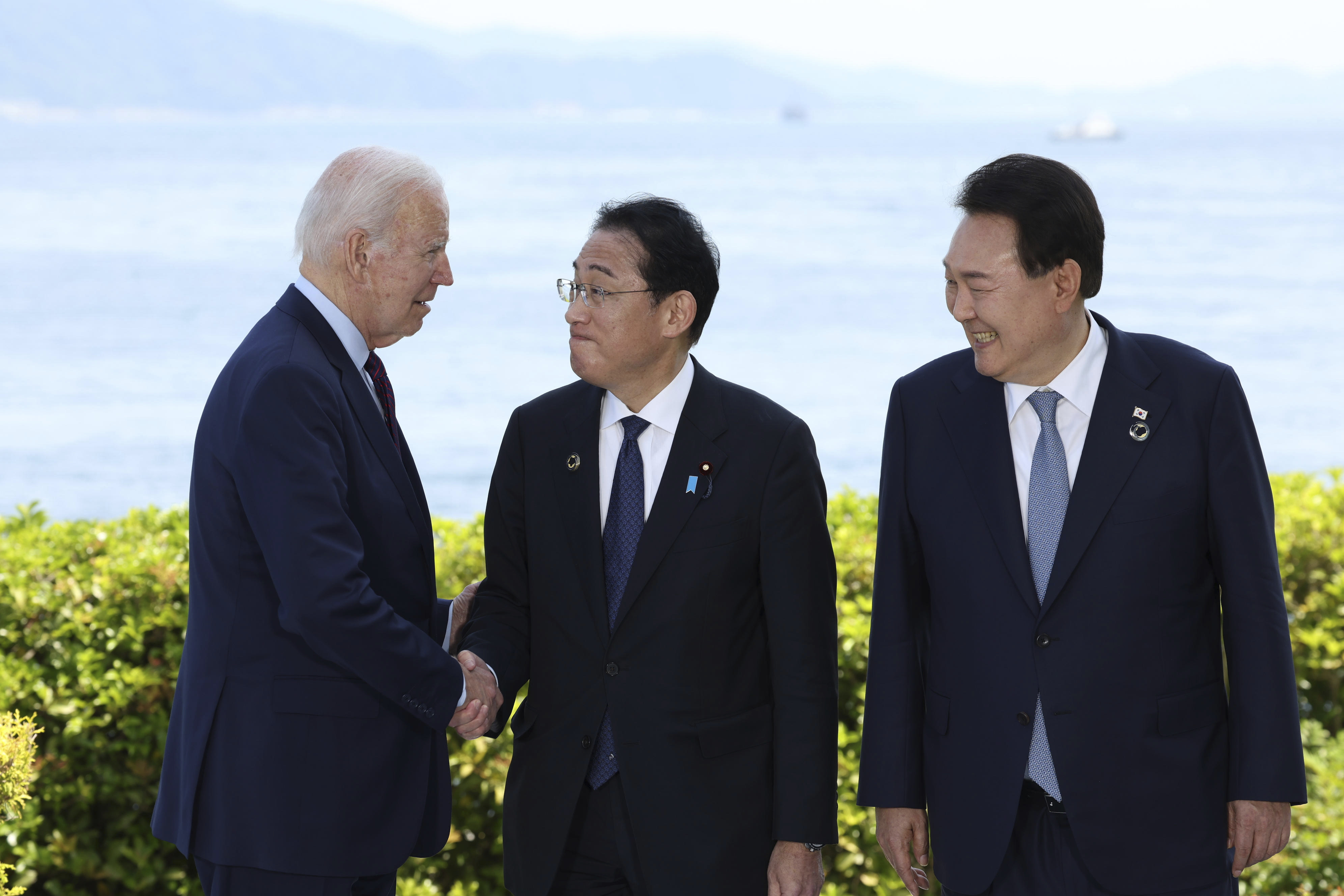Summit
Historic summit at Camp David

It is a summit location with strong symbolic power: On August 18, U.S. President Joe Biden, South Korean President Yoon Suk-Yeol and Japanese Prime Minister Fumio Kishida will meet at Camp David. The famous vacation residence of the American president was previously the place of origin of important diplomatic agreements, such as the peace treaty between Israel and Egypt.
The rhetoric from the U.S. goverment reflects high expectations. John Kirby, spokesman for the U.S. Security Council, attaches historic importance to the meeting for the entire world. There is a reason for the euphoria in the USA. For the first time ever, the leaders of the U.S. and the two Asian liberal democracies are coming together for an exclusive tripartite meeting. Previous trilateral talks have only ever taken place on the sidelines of larger summits.
Deepened cooperation among the United States, Japan and South Korea has long been a goal of U.S. foreign policy and it is an important pillar of Biden's Indo-Pacific strategy. However, cooperation has always been hampered by tensions between Japan and South Korea. The fact that the mistrust between the Asian democracies is now easing is also good news for Europe - it should make coordination and cooperation between the two important partners in Asia easier in the future.
tense relation between Japan and South Korea
The improved relationship between Japan and South Korea is primarily thanks to South Korean President Yoon. Since assuming office in 2022, Yoon has sought to improve relations with neighboring Japan. Yoon and Kishida have already met at one summit each in Japan and South Korea. In the twelve years before that, no visits took place - even though both Asian democracies are actually value-based partners and share many interests.
The historical context for the tension between Japan and South Korea stems primarily from Japan’s occupation of South Korea between 1910 to 1945, during which the country was exploited and subjected to forced labor. South Koreans find it particularly painful that the Japanese abducted tens of thousands of young Korean women and abused them as sex slaves in soldier brothels.
The dispute most recently escalated in 2018 when a South Korean court ordered two Japanese companies to pay compensation for forced labor. Japan subsequently removed South Korea from its so-called "white list" of trusted trading partners and imposed export bans on three key intermediate products for South Korea's important semiconductor industry. South Korea also responded with trade restrictions and reduced military as well as intelligence cooperation with Japan.
President Yoon played a pivotal role in resolving this impasse, and has accepted that victims of forced labor would be compensated with donations from Korea. Japanese companies are left to decide whether to participate. The deal is controversial among the Korean population. Many Koreans see it as kowtowing to Japan. Accordingly, the agreement is fragile. But at least for the time being, history does not seem to stand in the way of a rapprochement.
Both nations stand to gain significantly from this reconciliation - especially in interaction with the United States. Back in June, for example, the three states agreed to set up a joint system to monitor North Korean missile launches. Moreover, both states see themselves increasingly threatened by China's assertive actions – viewing their neighboring democracy as a natural ally against the rising authoritarian state.
More Cooperation with NATO
Cooperation extends beyond the U.S., as NATO seeks closer integration of both countries in the future. Both Japan and South Korea are part of the so-called Asia-Pacific Partners (AP4). By involving the Pacific partners, NATO hopes to gain better "situational awareness of security developments". NATO explicitly mentions the "rise of China" here.
In economic terms, the first positive effects of the rapprochement are already becoming apparent. For example, Japan is to be increasingly involved in the development of a semiconductor cluster in the South Korean city of Yongin. With an investment volume of more than 200 billion euros, the site is to become one of the world's most important semiconductor production sites by 2042. In return, the Korean corporation Samsung is also planning to build a chip factory for prototypes in Japan - financed by Japanese subsidies.
Closer ties between the two major chip players will increase the resilience of global semiconductor supply chains. Economic cooperation, particularly in high technology and the semiconductor sector, will be one of the focal points of the Camp David talks. Stronger controls on investment into China are also likely to be on the agenda. The restrictions are intended to prevent the People's Republic from obtaining militarily relevant high technology. Only on Wednesday, U.S. President Biden had issued a decree to this effect. The USA is calling on its partners to take similar measures.
China remains sceptical
In Beijing, however, the rapprochement of the three democracies is viewed with skepticism. The state medium Global Times is already talking about a "mini-Nato" whose sole aim is to encircle China. "It is unlikely that such trilateral cooperation will reassure other countries in the region," the commentary says. Those who do not join the trilateral alliance would later be labeled "foreign" or "threatening."
However, criticism from Beijing will hardly stop the three liberal democracies from intensifying their cooperation in the future. Rather, domestic political reservations could make rapprochement more difficult. It is unlikely that a comprehensive reappraisal of its historical crimes will begin in Japan in the coming years. Accordingly, the South Koreans could reject further rapprochement and future governments could change course again. The current governments, however, seem determined to continue on the path they have taken: According media reports, they are discussing meeting annually in the future.
Frederic Spohr heads the Korea office of the Friedrich Naumann Foundation in Seoul. Twitter/X: @fspohr
